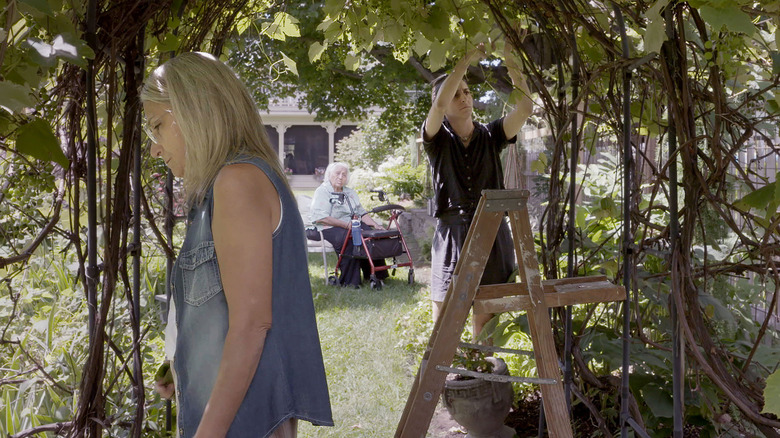Joonam Review: Intimate Documentary Nails The Mother-Daughter Dynamic [Sundance]
The relationship between a mother and daughter can be complicated, even in the best of circumstances. Throw in a maternal grandmother, intergenerational trauma, and a diaspora — well, things are bound to get heavy.
"Joonam" is a documentary about one filmmaker struggling to come to terms with her family history. Sierra Urich was born and raised in Vermont, far away from her mother's homeland, Iran. She speaks English, which makes communication with her Farsi-speaking grandmother difficult. The film actually gets its title from a Farsi term of endearment, "joonam"; in one of the home movies from Sierra's childhood, her mother can be heard offscreen using it for her. I don't think it's used as the title strictly in a self-reflexive way — rather, I think here it's a statement reflecting the deep love between mothers and daughters, including Sierra's feelings towards her family.
The director Sierra Urich is American born and raised. She wants to connect with Iran, the country her mother Mitra Ulrich and grandmother Behjat Samimi left due to political upheaval. Sierra had family members who were military under the Shah, the monarchy that was overthrown during the Iranian Revolution in the late '70s. When Mitra left Iran to study in America, she had no idea at the time that she wouldn't be returning. As she testifies later, she was completely unaware that leaving meant not seeing her beloved parents for sixteen years.
The revolution might seem like old history, but not for the current political climate; tensions are so high, in fact, that Sierra's Farsi tutor tells her he cannot continue teaching her because her Shah connections could put him under suspicion for terrorism. It's pretty intense — and does a lot to explain why Sierra has such a longing to visit Iran yet has never done so. Clips of current Iranian feminist activists on TikTok juxtapose archival footage of the revolution and Mitra's own rebellious activities as a young woman. The implication is clear: Sierra longs to join them, but her American upbringing and sheltered life have made doing so impossible; as she tells her mother in one argument, Mitra's fears have made Sierra feel like an "outsider."
Joonam made me cry (a bunch)
"Joonam" is a well-constructed, personal journey through identity and family history. It doesn't have a strong, clear story — it's more like a meditation on the subject. We get snippets of very personal moments between the women, and the family history is teased out through casual interviews, old images, and montages. Behjat is very funny in the way that tough, independent women of her generation often are (she reminded me a lot of my Mémère actually). You can feel the love she has for her family. She expresses herself with such quiet, tender kindness that hints at deep wounds; more than once, I was brought to tears.
"I have really gotten used to your voice, your face, your words, your laugh," she says to Sierra, who cannot understand her Farsi words. "I need to take some space to savor this ... We're making up for the years you weren't close by." It's only after Sierra gets the footage back from the translator that she retroactively can relive the moment and finally hear what her grandmother is saying. (It's implied this happened after Behjat's passing, which is only ever alluded to, apart from the dedication at the end.) We as the audience experience this moment via Sierra's recorded audio testament, followed by the scene with subtitles. It's beautiful but also just so deeply heartbreaking.
As much as I personally really enjoyed "Joonam," I don't know that this is a documentary that will land well with general audiences. I am close with my maternal grandmother (and I was close to my Mémère before her passing), so there's a lot in Sierra's story here that I can connect with. The film really leans into exploring the unique flavor of mother-daughter — and grandmother-granddaughter — relationships, but in a passive, almost detached manner. We are voyeurs getting a glimpse at very personal, intimate moments, and the almost intrusive nature of our presence — represented by the camera's insertion into these situations — is reinforced by the fact that faces are often obscured, out of frame, or in the distance.
I don't think this was a bad choice artistically; the overall effect is that the exchanges feel very natural and raw. But I do worry that for some, this detachment will create too much emotional distance in the viewing experience for audiences who can't relate to these unfiltered, nuance-heavy exchanges. It's a bit like the film "Lady Bird" but stripped down to its core — and complicated by the fact that it's real-life, and not scripted and rehearsed dialogue.
"Joonam" is an emotional, personal documentary that reflects the talent of its filmmaker. Not everything worked, but for a feature film debut, it's a strong one. I look forward to seeing what Sierra Urich does next.
/Film rating: 7.5 out of 10

